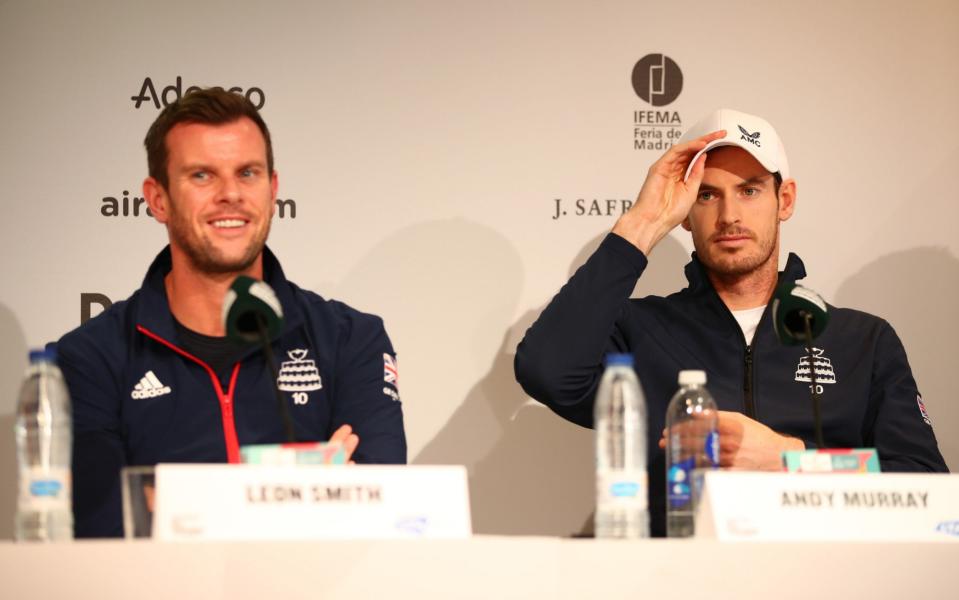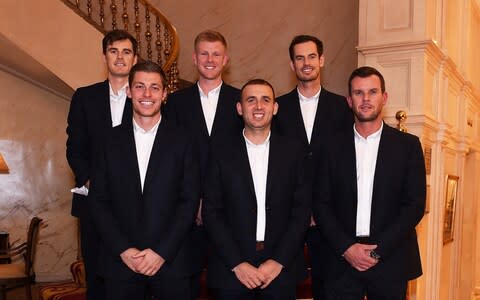Frivolous Great Britain determined not to be frozen out in new-look Davis Cup

As Great Britain prepared to face Holland on Wednesday at the new-look Davis Cup, team bonding reached such heights of levity that the five players took turns to drop quotes from Frozen, Disney’s animated hit from 2013, into their press-conference answers.
Experienced camp followers noticed a possible prank at play as soon as Kyle Edmund – normally a platitude merchant of the highest order – responded to a question about heavy workloads by echoing an early warning from the film: “Fear will be our enemy.”
Would the British team have been so flippant before the Davis Cup final of 2015? It seems unlikely. As the players settled themselves in Ghent four years ago, their quest for a first team crown since 1936 carried real weight.
This event, by contrast, has an ersatz feel to it. The self-styled “World Cup of Tennis” comes across as an experiment, an opening bid from the Kosmos consortium and its famous footballing frontman Gerard Pique.
Kosmos must be furious that – as a result of tennis’s toxic internal politics – their new baby has been relegated to the end of November, in the dog days of an already overlong season. Nor can they be happy about the proximity of the ATP Cup, the other new team competition, which will launch on January 3 in Australia.
These next couple of months will function like one of those David Attenborough films in which a pair of alpha males headbutt each other for breeding rights. Gradually, one of the new competitions will claim the upper hand, and its owners – either Kosmos or the ATP Tour – will then set out terms for an inevitable merger.
Still, whatever happens over the next season or two, Andy Murray repeated his insistence on Tuesday that we should not be too hasty in writing off the Kosmos model. As Murray put it, “I just feel in tennis sometimes we are quite reluctant to make changes. Let’s see how it is at the end of the week.”
Murray also referred to those “who want to bash the event before it’s started,” adding that “they need to ‘Let It Go’.” But it was hard to know how seriously to take this comment. His main motivation, it seemed, was to shoehorn in another Frozen reference via the title of the movie’s best-known song.
The British team missed one obvious Frozen allusion on Tuesday by not mentioning Madrid’s frosty weather. For all the charms of this magnificent city – which stands at an altitude of almost 700 metres – it feels odd to watch a would-be World Cup unfolding during the European winter.
As for Great Britain’s first opponents, Holland got off to a sticky start on Tuesday when they lost 2-1 to Group C’s other team, Kazakhstan. At least, we think that was the outcome. It was hard to tell when the results service on both the Davis Cup’s iPhone app and website broke down.

While Leon Smith will be desperate to get off to a winning start, he is also keen to manage his players’ workload. As a result, he may choose to omit Murray on Wednesday against relatively weak opposition, and rely on Dan Evans and Kyle Edmund instead.
Summing up the atmosphere here is tricky, because it varies so markedly from court to court. There are three stadiums of different capacity: a maximum of 12,000 on the main arena, 3,500 on Stadium 2 and 2,500 on Stadium 3.
Admittedly, the house was jumping on Tuesday for the entry of Spain, who were able to deploy Real Madrid superfan Rafael Nadal against Russia. But France – the defending champions – played in near-silence on an almost deserted Stadium 2. As doubles specialist Pierre-Hugues Herbert joked afterwards, “Actually, it was pretty special, because it was the first time I hear myself singing La Marseillaise.”
So far, this new event has been beset by all sorts of fringe issues, including obscure broadcasting partners and a lack of big-name sponsors.
The actual tennis, though, has been highly entertaining to date.
Each team earns $600,000 (£464,000) by being here, with bonuses of at least $400,000 (£310,000) if they reach Friday’s quarter-finals, and a top whack of around $3.2 million (£2.47 million) for the winners. For the participants, then, there are plenty of reasons to care.

